

Is Fashion a Credible Platform for Protest? Vivienne Westwood Red Label Spring/Summer 2015, Jean Paul Gaultier Spring/Summer 2015, Stella McCartney | Photo Collage: BoF LONDON, United Kingdom — Last week in Paris, Chanel appropriated the visual signifiers of feminist protest for its seasonal runway show.
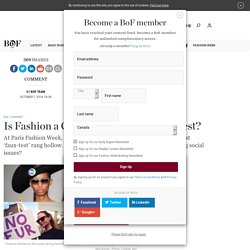
In a finale led by Karl Lagerfeld, a bevy of supermodels took to a catwalk christened “Boulevard Chanel” holding signs with slogans such as “History is Her Story,” “Make Fashion Not War,” and “Tweed Is Better Than Tweet.” On the same day in Hong Kong, a genuine protest was underway. Protesting for the right to democratically elect a candidate of their own choosing, tens of thousands of Hong Kongers formed crowds that throbbed and swelled in the city’s streets.
Playing out against this backdrop, the “faux-test” staged on Boulevard Chanel rang especially hollow, repackaging political riot as a light-hearted, Instagram-savvy performance. We think it can. Top Fashion Schools in the UK: Bracing for Brexit. LONDON, United Kingdom — UK schools topped BoF’s 2016 global fashion school rankings, with Central Saint Martins in the number one spot at both BA and MA level (having also ranked first at BA level last year), and Kingston University in second place at BA level.
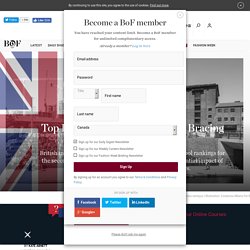
Eleven UK institutions made the ranking, with three UK schools in the top 10 at BA level, the most of any country in our survey. Like the UK fashion industry — which contributed £26 billion to the country’s economy in 2014, according to Oxford Economics — British fashion education is concentrated in London, home to six schools in our ranking. However, the results of the European Union referendum has created a cloud of uncertainty over the nation’s fashion schools, which depend on EU funding, students, staff and research networks to maintain their world-class position. Kingston University | Source: Courtesy EU students in the UK could lose access to student loans, grants and scholarships.
Central Saint Martins | Source: Courtesy. Brexit: The brand winners. While the FTSE 100 and UK currency have both seen declines, some brands are expected to benefit from Brexit.
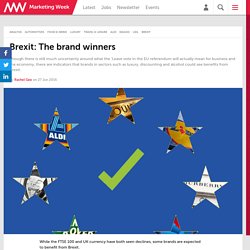
Aldi & Lidl As the pound dropped to a 31 year low following the initial news of the outcome, concerns of another recession hit and Mike Watkins, head of retail and business insight for Nielsen UK predicted an “inevitable impact on disposable income”. That should be positive news for the discounters Aldi and Lidl as well as retailers such as Poundland. “People still need to eat and as the market is already so deflationary, the rise of inflation won’t have as big as an impact as people might think on grocers,” said Watkins. Only now consumers are more likely to turn to discounters as opposed to the “big four”. Discount supermarkets including Aldi, Lidl and Poundland could thrive from the EU exit, due to their ability to distribute their products with such small costs and Aldi’s use of British products.
Premier Inn & Travelodge Burberry & Louis Vuitton Jaguar Land Rover. After Brexit, which way for fashion? The impact of Brexit on the fashion industry is daunting, brain-scrambling and multi-levelled.
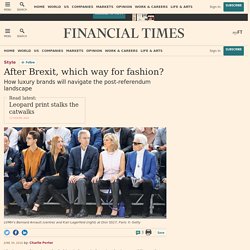
The industry directly contributed £28bn to the UK’s economy in 2015 and employs 880,000 in roles from manufacturing to retail. For many British designers and stores, there will be an immediate hit on costs and margins. Once Brexit has been achieved, it could jeopardise design talent and retailers within the global marketplace forever. Sample the FT’s top stories for a week. Debate: Does Fashion Have A Place In Politics? What Brexit Means for the Fashion Industry. Today's news that Britain has voted to leave the European Union has sent stock markets plunging and hammered the British pound, which hit its lowest point in decades.
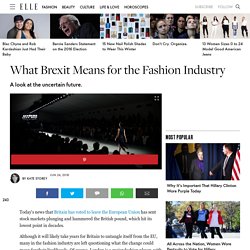
Although it will likely take years for Britain to untangle itself from the EU, many in the fashion industry are left questioning what the change could mean for their livelihoods. Of course, London is a major fashion player, with the fashion industry contributing an estimated $38 billion to the UK economy in 2014, according to the Business of Fashion.
Advertisement - Continue Reading Below A weak pound and uncertainty about new tariffs could mean major challenges for UK-based businesses, which often source fabrics and produce in other parts of Europe. Before last night's vote, the British Fashion Council surveyed its members and found that the vast majority—90% of members—wanted to remain in the EU. This turmoil is predicted to affect prices of items coming into and out of Britain, as well. Getty.